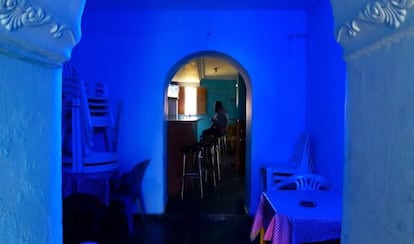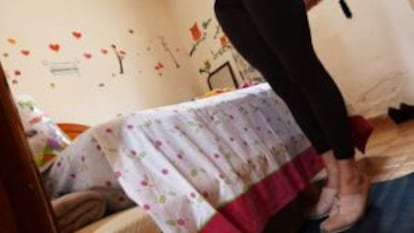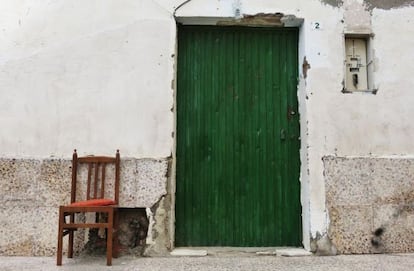No way out for Almería’s prostitutes
Hundreds of women are working in virtual slavery in brothels throughout the province Trapped by their debts to traffickers, they have seen their conditions worsen with the crisis

A nameless bar sits hidden amid the plastic-sheeted greenhouses that sprawl up the hillsides outside the coastal town of Roquetas de Mar, in Andalusia’s Almería province. Inside the squalid blue-lit interior waits Aite, an attractive, well-turned-out Nigerian woman in her early twenties.
“I came to Spain because I believed that Europe was wonderful. But now, with the crisis, I don’t know what to do: no men come here any more,” says the former nurse.
Aite is a legacy of the prostitution that spread throughout Almería in the 1990s when large-scale intensive agriculture took off. By the end of the decade, there was enormous demand for low-paid workers, who arrived in huge numbers, many employed illegally. With them came low-cost prostitution, usually carried out by women with no residency or work permits either, most of whom were controlled by organized crime gangs who put them to work in the brothels they set up along roads on the outskirts of the town.
Andalusia’s regional government-funded Women’s Institute says that Almería and Cádiz provinces are two of the main entry points for women trafficked into prostitution in Spain.
Working freelance

Not all women working as prostitutes are from overseas and controlled by organized crime networks. But there is very little information available about Spanish women, or women with Spanish citizenship, working in the sex industry. Apramp, an NGO that works with prostitutes, says around 90 percent of prostitutes in Spain are from abroad, but adds that as the economic crisis has worsened over the last five years, the number of non-foreigners working in the sex industry is growing. Margarita, a single mother originally from Venezuela, who has been living in Spain for the last decade, began working as a prostitute a year ago. Twice a month she travels to Almería to a rundown farm building she rents with a Brazilian woman for €400. “I’m lucky, I guess, because the clients don’t hassle me too much. They just do the business: stick it in, pull it out, and they’re on their way,” she says.
Virginia is Spanish, and advancing in years. She says she used to have her own bar, but the authorities closed it after repeated problems with noise and fighting. Now she runs a dilapidated place in one of the roughest areas in Roquetas de Mar. “The girls come and they sit here, and they wait for the men,” she says, pointing toward a row of sofas at the end of a darkened garage that stinks of urine and excrement. She charges the women who work here for using a storage room with a rickety bed covered in filthy blankets.
“I clean houses during the day, and then come here,” she says. “But if there are other girls, I let them deal with the customers, so they can take a little money home.”
The living conditions of the hundreds of women believed to be working as prostitutes in Almería have worsened as the crisis has deepened over the last five years: in some places, they charge as little as €10 for sex. In 2012, the Health Ministry estimates that there were more than 12,300 women at risk of being sexually exploited in Spain.
“The figure could easily be three times that,” says José Nieto, intelligence chief at the police’s General Office for Foreign Nationals. “Most have no papers, so it is difficult to know how many are working for themselves or are being run by gangs. Andalusia’s regional health department, which supports NGOs that work with prostitutes in Almería, says it attended to 2,200 women in the province in 2013. The regional government funded 19 projects last year to help prostitutes who were being pimped by gangs.
In Roquetas de Mar, a chair outside the door to a farm building indicates that sex is for sale inside. Inside, heavily made-up women in tight clothes spend their days and nights between the four walls of these rundown sheds with their corrugated iron roofs, unpainted cement walls and broken glass.
Each has a story to tell: Nayaj was still selling her body when she was eight months pregnant – she lost the baby when her former partner stabbed her in the stomach; Laila can no longer sleep or eat, fearful that her ex will come back looking for her; Fátima’s face is covered in bruises that she says were caused when she walked into a door; Linda lost her sight in one eye when she fell out of the boat that was bringing her to Spain; and Nadia says she hasn’t seen her son since her last visit to Russia five years ago.
Some of these women left their children behind when they came to Europe; others were raped along the way. Those whose children live with them send them to local schools while they try to make a living; an increasingly difficult challenge in Almería, where the unemployment rate is 36 percent, and almost a third of the economy is underground. If the local men are not earning, the women in the brothels aren’t either. “Before, you could sometimes earn €500 a night, but this year there have been many when I didn’t earn a thing, and I’d cry, because I felt stupid,” says one young woman in her early twenties from eastern Europe who calls herself María. She says it took her three years to escape from the man who was pimping her.
The police estimate that prostitution is now worth around €5 million a day in Spain; a huge sum, but significantly less than during the boom years of a decade ago. “With the crisis, these brothels are running at around a third of their capacity, and there are now fewer networks, but they are more complex,” says Nieto. As their revenue falls, the traffickers are becoming increasingly violent. “For the first couple of years, he treated me well, because there was money coming in. Then he started to beat me,” says María. Her pimp would call her at all times during the day. “He’d say to me: ‘Why don’t you want to earn money? You don’t do anything except sit around all day smoking’.” Aite refuses to say whether she pays money to the owner of the bar where she works, who in turn complains that he can barely afford to pay the electricity bill. Sonia, a young woman from Equatorial Guinea, says she pays the owner €2 for every client.
The Latin American women normally end up with debts they can never pay back
The gangs that traffic women impose different debts and conditions on their victims. “The African women usually owe around €50,000 for having been brought to Spain. It usually takes them around eight years to pay back the debt, and they are usually kept in apartments. The Latin American women are normally sent to work in roadside brothels, and end up with debts that they can never pay back; the girls from eastern Europe are subjected to violence,” says Nieto.
María describes her arrival in Spain: “It took four or five days to get here. I was nervous, sweating and pale, I hadn’t eaten: everything I ate I just vomited back up straight away.” A couple of days after arriving she was put out to work on a main road, where she would have to stand from early in the morning until late at night. “I was supposed to stand the whole time. If I sat down, he would call me and tell me to stand back up. How did he know? But he would say that he had many contacts. He would take me to and from work. The rest of the time I was kept under lock and key,” she says.
“It’s very difficult to trace these women: they tend to have their telephone on all the time so that the people running them can monitor what they are saying and doing,” says Asmah, a psychologist who works with Doctors of the World, an NGO that works with groups trying to combat people-trafficking. Using a mobile clinic, she and others visit the greenhouses throughout Almería, offering medical and psychological support to the women working there.
The majority of the women whom Asmah visits every three weeks have their cellphones in hand at all times. They come aboard the mobile clinic alone. They don’t have to provide any information about themselves; most lie about their age, says Asmah. The psychologist says that the decline in the number of men paying for sex means that the women are under pressure not to use condoms: “This increases the risk of the transmission of sexual diseases or pregnancy.”

The women say they are well, but they are poor liars, says Vladimir, a nurse with Doctors of the World: “They can’t look you in the eye, and they try to smile; they only tell you the truth when they are really in trouble.” Today, he’s examining a young Nigerian woman who calls herself Jennifer; her pulse is running at 130 beats a minute. Vladimir gives her a letter to take to the emergency unit at the nearby hospital asking for a series of tests to be carried out. Jennifer is lucky to be working in Andalusia, where the Socialist Party and United Left coalition regional government has ignored the central government’s orders to provide only emergency services to people without residency permits. “In other regions, she would have had to sign a payment agreement, even though emergency treatment is meant to be free,” says a Doctors of the World spokeswoman.
Asked if the medical staff ever feel they should report what they know about the women’s situation to the police, Elena Guerra, an outreach worker with the Adoratrices religious charity, which works with prostitutes, says it is a difficult decision to make: “We have to have firm evidence; if we go to the police with a suspicion and the case fails, then we can often be putting a woman in greater danger: she may no longer trust us and come to us for help.” In 2012, the police carried out 271 raids on brothels, detaining 783 people, and identifying 567 women.
María, who is now living in sheltered housing, finally summoned up the courage to report the people who were exploiting her. “I wanted to leave for a long time. I used to ask myself: how could I get off this road?” Three months ago, she contacted a social worker. Her main concern was not being able to make a living so as to send money home; then there were also the threats from the pimps. “Prostitution is a denigrating thing to have to do, and nobody does it unless they are extremely vulnerable,” says the Andalusian Women’s Institute: “The link is very clear.”
Tu suscripción se está usando en otro dispositivo
¿Quieres añadir otro usuario a tu suscripción?
Si continúas leyendo en este dispositivo, no se podrá leer en el otro.
FlechaTu suscripción se está usando en otro dispositivo y solo puedes acceder a EL PAÍS desde un dispositivo a la vez.
Si quieres compartir tu cuenta, cambia tu suscripción a la modalidad Premium, así podrás añadir otro usuario. Cada uno accederá con su propia cuenta de email, lo que os permitirá personalizar vuestra experiencia en EL PAÍS.
¿Tienes una suscripción de empresa? Accede aquí para contratar más cuentas.
En el caso de no saber quién está usando tu cuenta, te recomendamos cambiar tu contraseña aquí.
Si decides continuar compartiendo tu cuenta, este mensaje se mostrará en tu dispositivo y en el de la otra persona que está usando tu cuenta de forma indefinida, afectando a tu experiencia de lectura. Puedes consultar aquí los términos y condiciones de la suscripción digital.








































